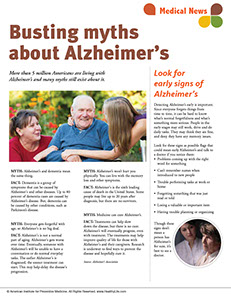MEDICAL NEWS
Busting myths about Alzheimer's

More than 5 million Americans are living with Alzheimer’s and many myths still exist about it.
MYTH: Alzheimer’s and dementia mean the same thing.
FACT: Dementia is a group of symptoms that can be caused by Alzheimer's and other diseases. Up to 80 percent of dementia cases are caused by Alzheimer’s disease. But, dementia can be caused by other conditions, such as Parkinson’s disease.
MYTH: Everyone gets forgetful with age, so Alzheimer's is no big deal.
FACT: Alzheimer's is not a normal part of aging. Alzheimer's gets worse over time. Eventually, someone with Alzheimer’s will be unable to have a conversation or do normal everyday tasks. The earlier Alzheimer's is diagnosed, the sooner treatment can start. This may help delay the disease's progression.
MYTH: Alzheimer’s won’t hurt you physically. You can live with the memory loss and other symptoms.
FACT: Alzheimer's is the sixth leading cause of death in the United States. Some people may live up to 20 years after diagnosis, but there are no survivors.
MYTH: Medicine can cure Alzheimer’s.
FACT: Treatments can help slow down the disease, but there is no cure. Alzheimer’s will eventually progress, even with treatment. The treatments may help improve quality of life for those with Alzheimer's and their caregivers. Research is underway to find ways to prevent the disease and hopefully cure it.
Source: Alzheimer’s Association
Look for early signs of Alzheimer’s
Detecting Alzheimer’s early is important. Since everyone forgets things from time to time, it can be hard to know what’s normal forgetfulness and what’s something more serious. People in the early stages may still work, drive and do daily tasks. They may think they are fine, and deny they have any memory issues.
Look for these signs as possible flags that could mean early Alzheimer’s and talk to a doctor if you notice them:
• Problems coming up with the right word for something
• Can’t remember names when introduced to new people
• Trouble performing tasks at work or home
• Forgetting something that was just read or told
• Losing a valuable or important item
• Having trouble planning or organizing
Though these signs don’t mean a person has Alzheimer’s for sure, it’s best to see a doctor.

Download an offline pdf file.
MEDICAL NEWS ARTICLES
<
>
2021 © American Institute for Preventive Medicine - All Rights Reserved. Disclaimer | www.HealthyLife.com








